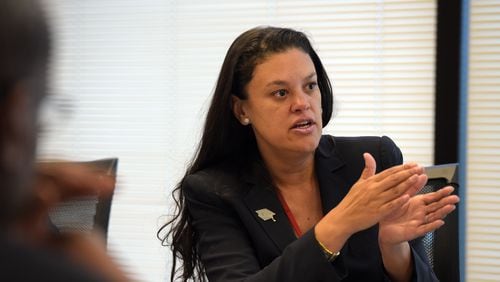About 200 parents filled the auditorium at Maynard Jackson High School tonight to learn about proposed school closings and consolidations in the cluster. Atlanta Public Schools superintendent Meria Carstarphen made an effort to answer everyone's questions, giving out her cell phone four times at the end for those who didn't get a chance to speak in the two-hour meeting.
Parents offered reasonable arguments for keeping their schools open. I don't know if their arguments will be enough to dissuade the district from closing schools that have too few students, including Benteen and Whitefoord elementaries. East Atlanta has already seen the closing of Coan Middle and East Lake Elementary, both of which remain empty.
I have covered many school closings, and they are always emotional. If it’s any consolation, parents often seem more affected than students who typically embrace their new schools quickly.
That does not mean there isn't loss. Elementary schools often are the heart of a community, and it’s dispiriting to pass a shuttered building that was alive with children a year earlier.
And parents in gentrifying east Atlanta have seen their share of school closings and reconfiguring, which is not the case with the midtown/Virginia-Highland/Morningside communities. One parent asked Carstarphen: Why not redraw all the lines so kids in the crowded schools in more affluent neighborhoods could fill some of the empty seats in the Jackson cluster?
Carstarphen did not pretend there was a logic to the school zones she inherited when she arrived here two-and-a-half years ago or that politics and race have not played a role in producing crowded schools in some areas and half-empty ones in others. She is still trying to make sense of a system that often defies reason, she said.
But, she said, redrawing the entire district was a major undertaking that would entail massive community involvement and she had immediate problems to solve. The small schools are costly. And APS has not seen strong evidence the smallness has led to higher performance or prompted more of the families flocking to east Atlanta neighborhoods to enroll their kids, said Carstarphen.
Yes, she was aware baby strollers are everywhere, but the detailed projection models didn't show those children coming to APS in droves. Instead, Carstarphen said those parents are choosing charter schools in the area and private schools. One of the state's most widely celebrated charters, Drew, serves more than 1,800 students in Pre-K through 12th grade. (A parent commented on Facebook there is also a thriving homeschooling community in east Atlanta.)
With 310 students, Benteen would be absorbed by the D.H. Stanton campus, creating an elementary school with about 600 students by the year 2019.
According to the school chief: Both Benteen and D.H. Stanton have capacity, but D.H. Stanton has a larger building. Also, a new Sheltering Arms Early Childhood Center will open this year to serve students from six weeks through Pre-K and that is a critical element in her goal of reaching children earlier.
Whitefoord students -- 272 of them --- would split; those from the Edgewood community would go to Toomer Elementary, while students from Reynoldstown would attend Burgess-Peterson Academy. Toomer would grow to 569 students, while Burgess-Peterson would increase to 457.
APS was built for more than 100,000 students, said Carstarphen. “We only have 40,000 in neighborhood schools. The other 10,000 are in charter schools.”
Parents defended their own school’s uniqueness. Whitefoord parents cited the school-based health clinic that provides services for students and their families. (Carstarphen wants the center to move with students.) Benteen parents pointed out the school’s success with Latino students.
A few parents were skeptical of Carstarphen’s contention consolidated schools will see significant increases in services and staff, with a mother pointing out she heard the same pledge when East Lake Elementary and Toomer merged and the extras never came. (East Lake closed in 2012; Carstarphen came to APS in 2014.)
Carstarphen stood by her pledge, citing the detailed information in the PowerPoint she presented to the crowd. She put the list before the public, she said, because she intends to honor it.
The Toomer parent also questioned whether the school would sacrifice the 15:1 student-teacher ratio it now enjoys if the consolidation is approved. Principals will decide class size and staffing, said Carstarphen. But she reiterated small schools and low teacher-student ratios had not necessarily proven a blueprint for success for Atlanta.
“There is no magic number,” she said. Referencing her former Texas district Carstarphen said schools in Austin with 800 to 1,000 students, even in poverty areas, “outperformed what we are doing today in Atlanta.”
The superintendent emphasized school principals would have to work together to ensure a smooth transition in the consolidations and leadership at the school level would be critical in making the plan work. “There is no other cavalry coming,” she said. “We have to figure this out for ourselves.”
About the Author







